Chapter 16 Imperialism: Europe Reaches Out
63 Slides2.99 MB

Chapter 16 Imperialism: Europe Reaches Out

Page 1A: Introduction In this chapter, you will learn about the spread of European imperialism in Africa, Asia, and the Pacific You will also learn how, through imperialism, European ideas and practices had a far-reaching impact on the rest of the world

Page 1B: Important Ideas With better rifles, improved medicines, steamboats, telegraph lines and railroads, European countries could expand into the interior of Africa, across the Pacific, and into the established societies of Asia for the first time. These new technological developments led to a wave of “New Imperialism”.

Page 1C: Important Ideas A variety of political, economic, and social motivations encouraged imperialism in the late 19th century. 1) New European countries like Germany, Italy, and Belgium wanted colonies to show they were equal to older European nations. 2) European countries also competed in the “Scramble for Africa” to preserve the balance of power. 3) European countries sought colonies to obtain resources and to find markets to sell their manufactured goods. 4) Many European imperialists looked to dominate Africa and Asia as part of their duty to spread what they saw as their superior civilization and culture.

Page 1D: Important Ideas Imperialism had different characteristics and effects in different regions. In India, Africa, and Southeast Asia, European countries established formal rule over colonies. They brought European technology, medicine, and civilization to those areas, but at the cost of suppressing local cultures, taking their resources, and using many local people for forced labor.

Page 1E: Important Ideas In both China and Latin America, European powers forced local groups to grant them special trading privileges and other economic benefits, but they did not directly take over local governments. In some areas, European powers faced fierce local opposition to their imperialist ambitions.

Page 3: Essential Questions 1) What impact did British have on imperialism? (2,4) 2) What were the causes of the “New Imperialism”? (6,8,) 3) How did imperialism have different characteristics in different places? (10,12) 4) Was the overall impact of imperialism good or bad? Explain, give 3-4 reasons. (14)

Page 5: Key Vocabulary/Terminology 1) 2) 3) 4) 5) 6) 7) 8) 9) Imperialism 10) Opium Wars Sepoy Mutiny 11) “Spheres of Influence” “New Imperialism” 12) Taiping Rebellion “Scramble for Africa” 13) “Open Door Policy” Suez Canal 14) Boxer Rebellion Berlin Conference 15) Meji Restoration Leopold II 16) “Informal” Imperialism Cecil Rhodes 17) Panama Canal Spanish American War 18) Monroe Doctrine

Page 2: What does imperialism refer to? The political & economic control of 1 area or country by another.

When did European nations 1st develop overseas empires? In the 15th century.

In 19th century, where did great European powers acquire vast colonial empires? Africa, Asia, Pacific

How can you describe The British “Raj” (Reign) In India? British rule brought many changes Some older customs, like suicide of widows when their husbands died were abolished 1st railway in India built 1853 Muslims and Hindus lived peacefully together European missionaries spread Christianity British schools and colleges opened English became language of govt. Despite benefits brought by British, Indians still upset by this challenge to their traditional ways

What did the British build in India in 1853? Railroads/railways

What religion did the British bring to India? Christianity

Why were British able 2 control India? Because Indians were divided among themselves. British had better weapons & used trained Indian soldiers/The Sepoys

Who were the “sepoys?” Trained Indian soldiers

How did British crush Sepoy Mutiny? British used “loyal” Indian soldiers.

What change did Britain make 2 India after the mutiny? They took over formal control of India & abolished the East India Company

Page 4: What did Queen Victoria become? Empress of India

What impact did British rule have upon India? Government – single system of law & govt., provided jobs, increased educational opportunities Economic - built roads, bridges, railroads, Indian cottage industries hurt by British competition Health - built hospitals, introduced new medicines, provided famine relief Social – Indians treated as inferior 2 European culture, Indian workers provided inexpensive labor

Where were other British Colonies? Cape Colony, South Africa Several islands in West Indies Canada Australia New Zealand Singapore

What colony did Britain have on the tip of South Africa? Cape Colony

Where else did Britain have colonies? Canada, Australia, New Zealand and Singapore

Where were other European Colonies Located? French: some colonies in West Indies, some trading posts in West Africa, India, Algeria in North Africa, Indochina Holland/Dutch: Dutch East Indies Spanish: colonies in Philippines, Cuba, Puerto Rico

What colony did France have in North Africa? Algeria

Where did France intervene in the 1860s? Indochina

What colonial possessions remained Spain’s? Philippines, Cuba and Puerto Rico
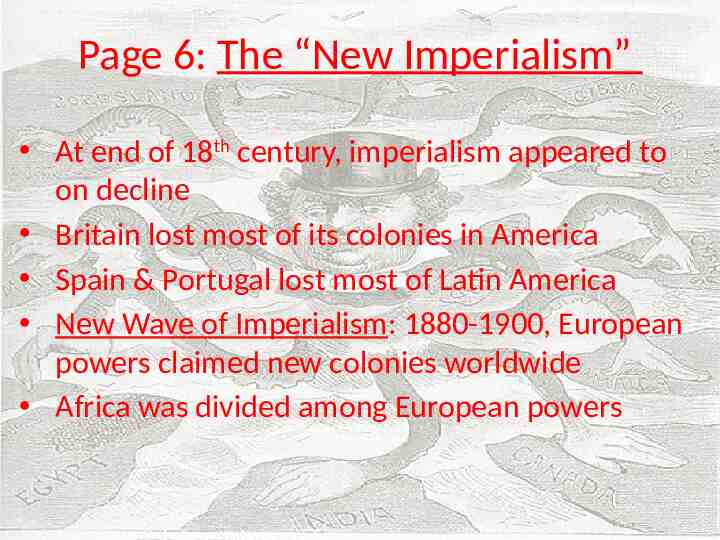
Page 6: The “New Imperialism” At end of 18th century, imperialism appeared to on decline Britain lost most of its colonies in America Spain & Portugal lost most of Latin America New Wave of Imperialism: 1880-1900, European powers claimed new colonies worldwide Africa was divided among European powers

When did the “New Imperialism” occur? 1880 to 1900

What did steamboat make possible in Africa? Made it possible 2 go upstream, reaching interior of Africa & other places previously too difficult 2 reach
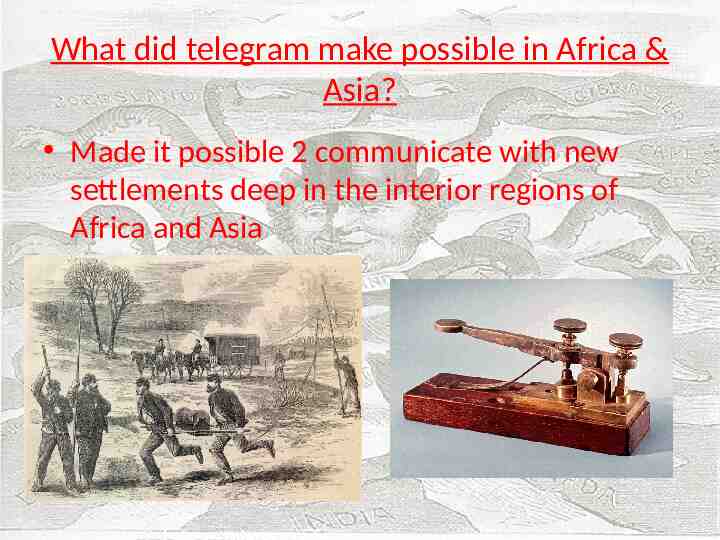
What did telegram make possible in Africa & Asia? Made it possible 2 communicate with new settlements deep in the interior regions of Africa and Asia
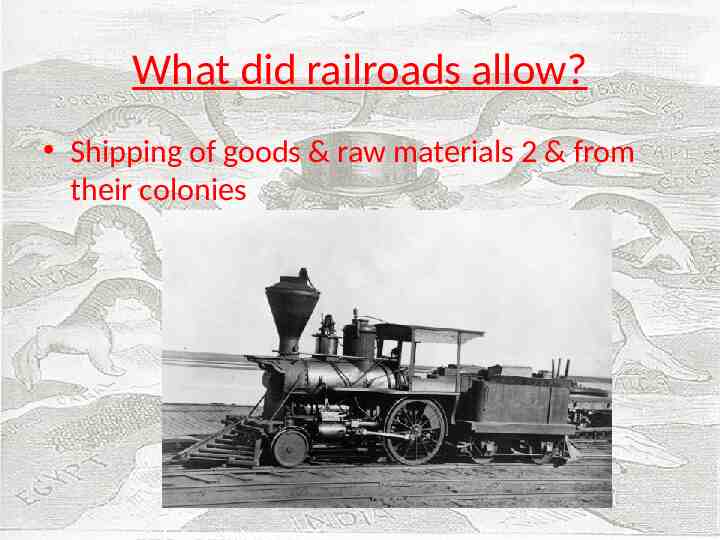
What did railroads allow? Shipping of goods & raw materials 2 & from their colonies
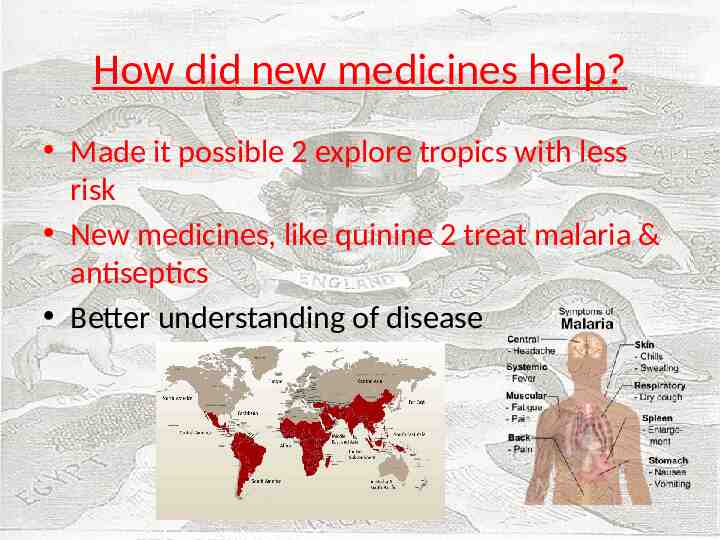
How did new medicines help? Made it possible 2 explore tropics with less risk New medicines, like quinine 2 treat malaria & antiseptics Better understanding of disease
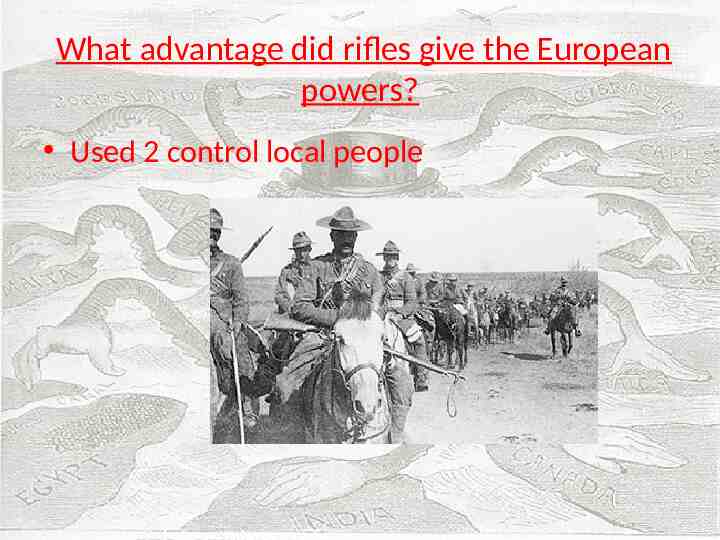
What advantage did rifles give the European powers? Used 2 control local people
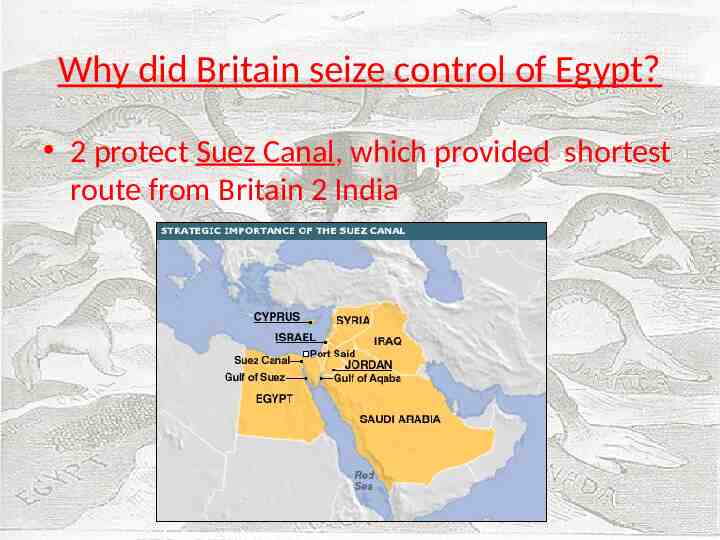
Why did Britain seize control of Egypt? 2 protect Suez Canal, which provided shortest route from Britain 2 India
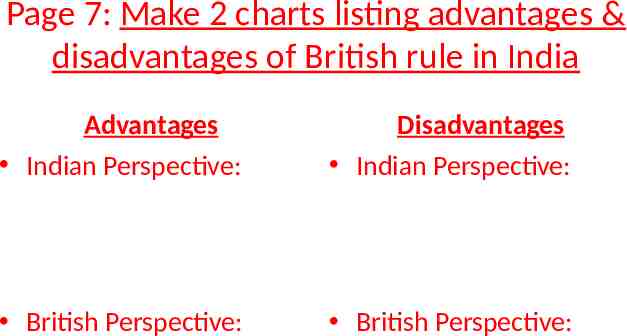
Page 7: Make 2 charts listing advantages & disadvantages of British rule in India Advantages Indian Perspective: Disadvantages Indian Perspective: British Perspective: British Perspective:
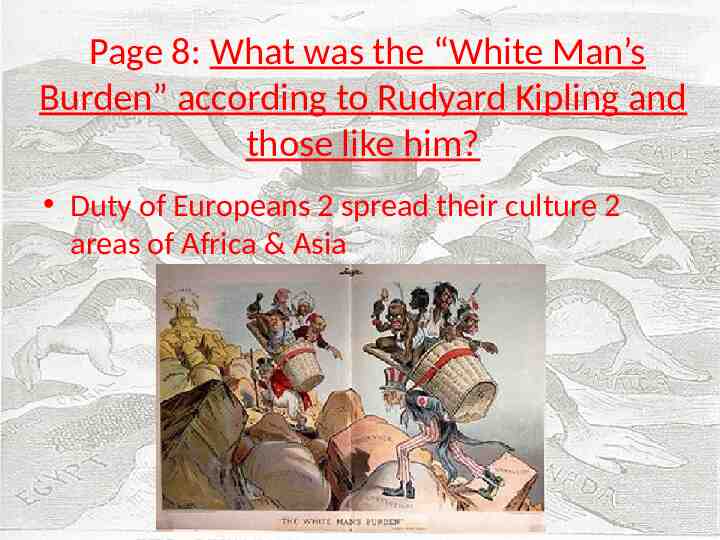
Page 8: What was the “White Man’s Burden” according to Rudyard Kipling and those like him? Duty of Europeans 2 spread their culture 2 areas of Africa & Asia
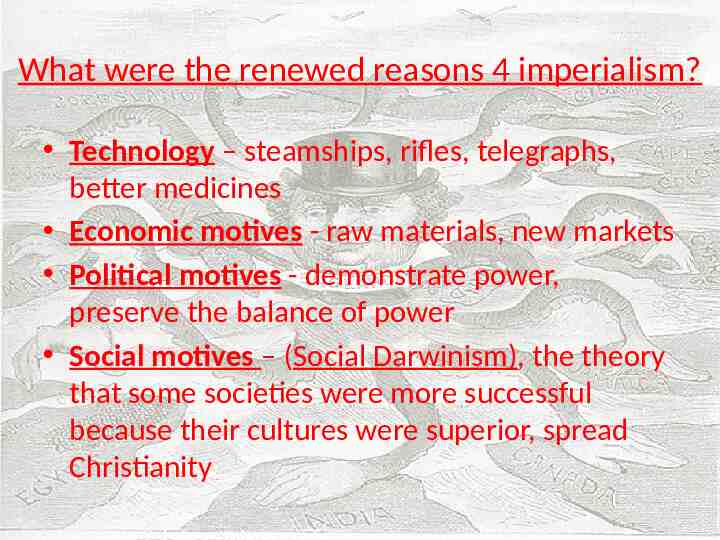
What were the renewed reasons 4 imperialism? Technology – steamships, rifles, telegraphs, better medicines Economic motives - raw materials, new markets Political motives - demonstrate power, preserve the balance of power Social motives – (Social Darwinism), the theory that some societies were more successful because their cultures were superior, spread Christianity
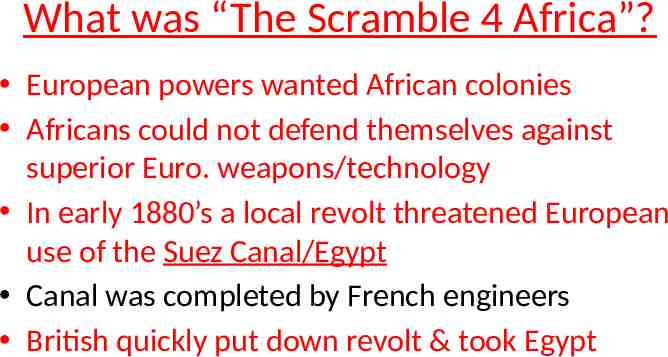
What was “The Scramble 4 Africa”? European powers wanted African colonies Africans could not defend themselves against superior Euro. weapons/technology In early 1880’s a local revolt threatened European use of the Suez Canal/Egypt Canal was completed by French engineers British quickly put down revolt & took Egypt
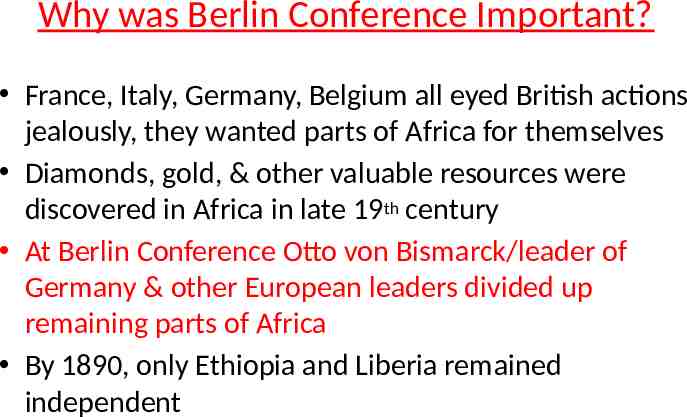
Why was Berlin Conference Important? France, Italy, Germany, Belgium all eyed British actions jealously, they wanted parts of Africa for themselves Diamonds, gold, & other valuable resources were discovered in Africa in late 19th century At Berlin Conference Otto von Bismarck/leader of Germany & other European leaders divided up remaining parts of Africa By 1890, only Ethiopia and Liberia remained independent
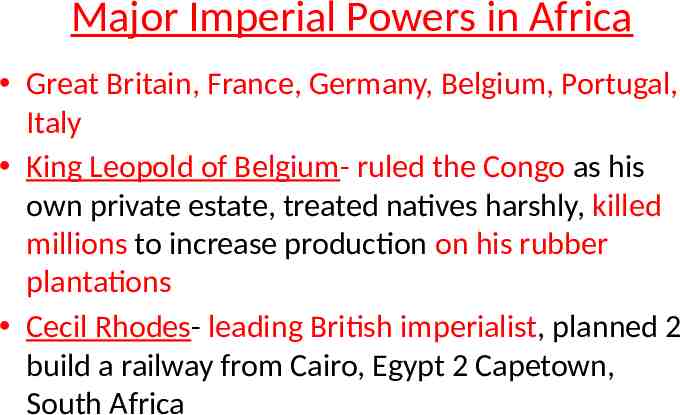
Major Imperial Powers in Africa Great Britain, France, Germany, Belgium, Portugal, Italy King Leopold of Belgium- ruled the Congo as his own private estate, treated natives harshly, killed millions to increase production on his rubber plantations Cecil Rhodes- leading British imperialist, planned 2 build a railway from Cairo, Egypt 2 Capetown, South Africa
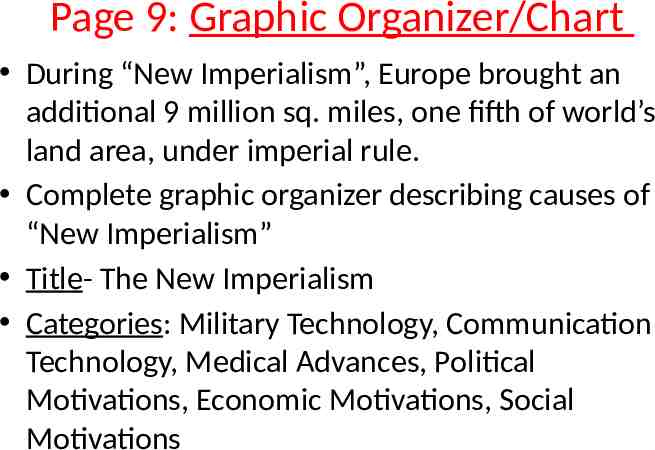
Page 9: Graphic Organizer/Chart During “New Imperialism”, Europe brought an additional 9 million sq. miles, one fifth of world’s land area, under imperial rule. Complete graphic organizer describing causes of “New Imperialism” Title- The New Imperialism Categories: Military Technology, Communication Technology, Medical Advances, Political Motivations, Economic Motivations, Social Motivations
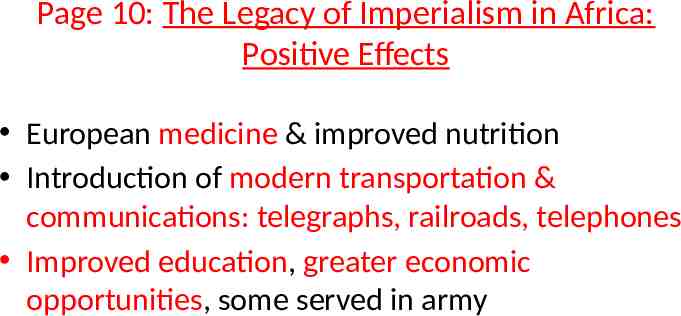
Page 10: The Legacy of Imperialism in Africa: Positive Effects European medicine & improved nutrition Introduction of modern transportation & communications: telegraphs, railroads, telephones Improved education, greater economic opportunities, some served in army
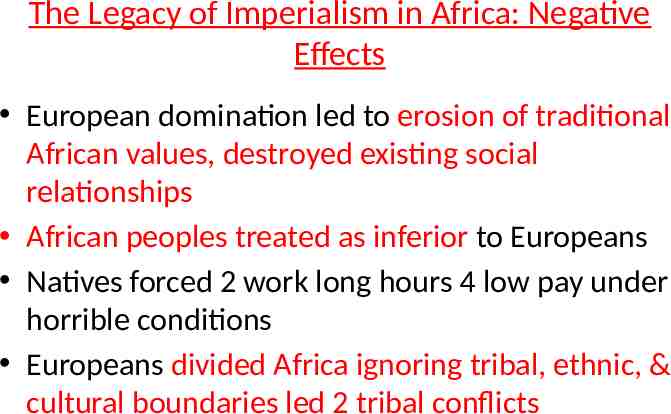
The Legacy of Imperialism in Africa: Negative Effects European domination led to erosion of traditional African values, destroyed existing social relationships African peoples treated as inferior to Europeans Natives forced 2 work long hours 4 low pay under horrible conditions Europeans divided Africa ignoring tribal, ethnic, & cultural boundaries led 2 tribal conflicts

“Informal” Imperialism Even in areas where Europeans didn’t establish direct rule, European powers often dominated an area’s economy “informal” imperialism
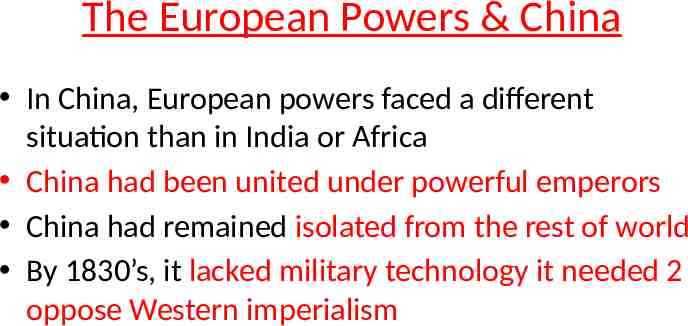
The European Powers & China In China, European powers faced a different situation than in India or Africa China had been united under powerful emperors China had remained isolated from the rest of world By 1830’s, it lacked military technology it needed 2 oppose Western imperialism
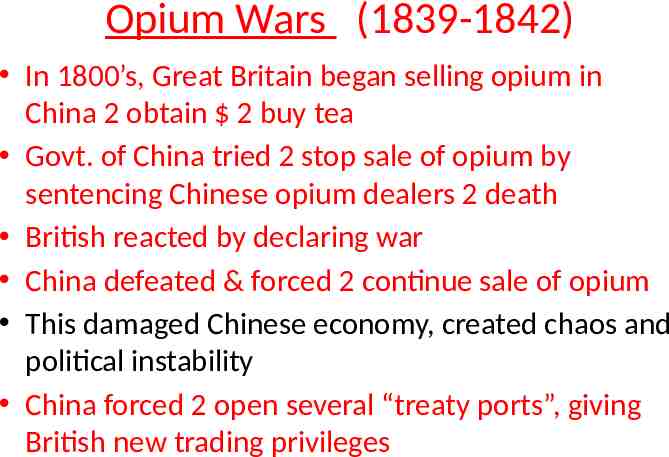
Opium Wars (1839-1842) In 1800’s, Great Britain began selling opium in China 2 obtain 2 buy tea Govt. of China tried 2 stop sale of opium by sentencing Chinese opium dealers 2 death British reacted by declaring war China defeated & forced 2 continue sale of opium This damaged Chinese economy, created chaos and political instability China forced 2 open several “treaty ports”, giving British new trading privileges
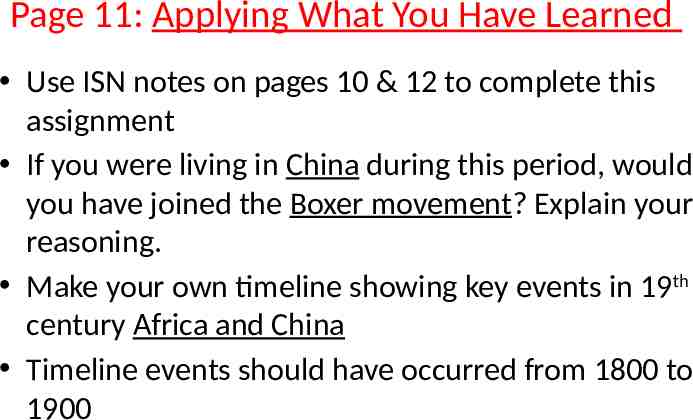
Page 11: Applying What You Have Learned Use ISN notes on pages 10 & 12 to complete this assignment If you were living in China during this period, would you have joined the Boxer movement? Explain your reasoning. Make your own timeline showing key events in 19th century Africa and China Timeline events should have occurred from 1800 to 1900
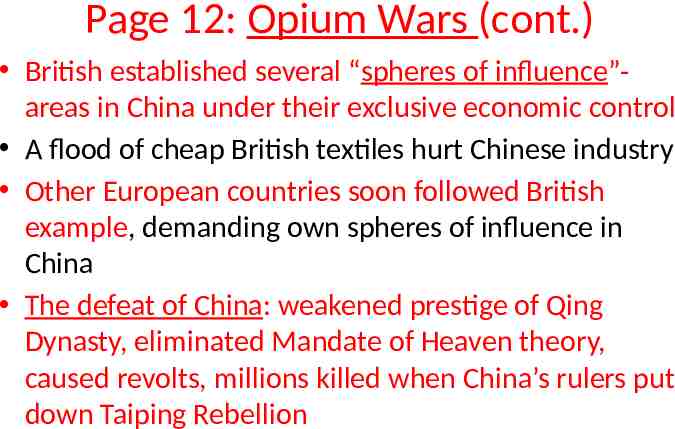
Page 12: Opium Wars (cont.) British established several “spheres of influence”areas in China under their exclusive economic control A flood of cheap British textiles hurt Chinese industry Other European countries soon followed British example, demanding own spheres of influence in China The defeat of China: weakened prestige of Qing Dynasty, eliminated Mandate of Heaven theory, caused revolts, millions killed when China’s rulers put down Taiping Rebellion

America’s “Open Door” Policy (1899) Fearing it would be shut out of China’s profitable trade, the U.S. proposed equal trading rights 4 all nations in China
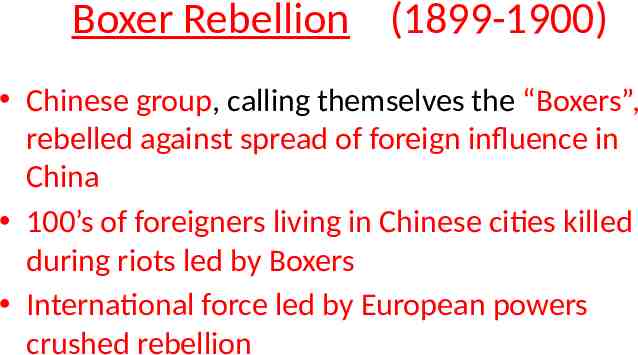
Boxer Rebellion (1899-1900) Chinese group, calling themselves the “Boxers”, rebelled against spread of foreign influence in China 100’s of foreigners living in Chinese cities killed during riots led by Boxers International force led by European powers crushed rebellion
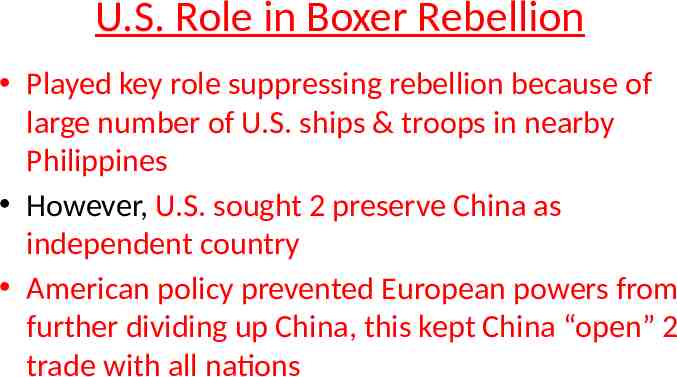
U.S. Role in Boxer Rebellion Played key role suppressing rebellion because of large number of U.S. ships & troops in nearby Philippines However, U.S. sought 2 preserve China as independent country American policy prevented European powers from further dividing up China, this kept China “open” 2 trade with all nations
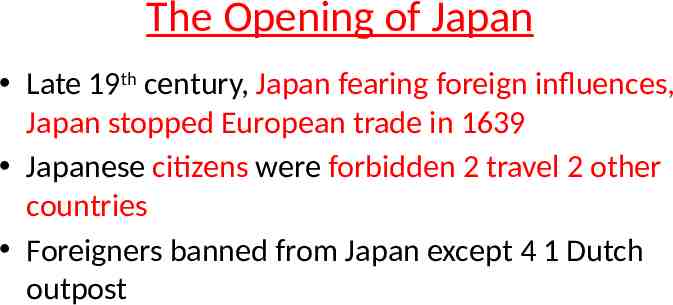
The Opening of Japan Late 19th century, Japan fearing foreign influences, Japan stopped European trade in 1639 Japanese citizens were forbidden 2 travel 2 other countries Foreigners banned from Japan except 4 1 Dutch outpost
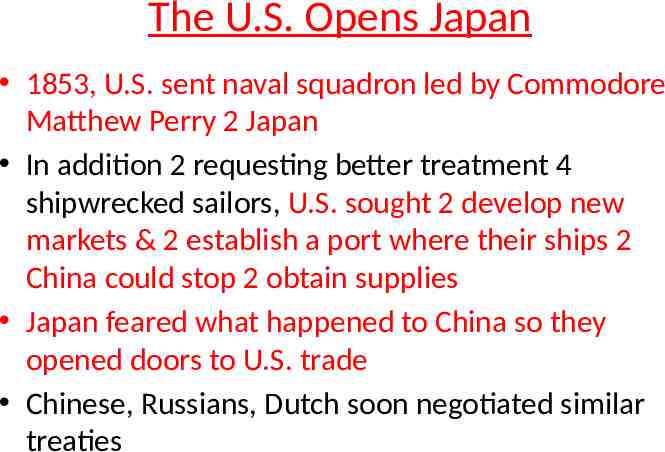
The U.S. Opens Japan 1853, U.S. sent naval squadron led by Commodore Matthew Perry 2 Japan In addition 2 requesting better treatment 4 shipwrecked sailors, U.S. sought 2 develop new markets & 2 establish a port where their ships 2 China could stop 2 obtain supplies Japan feared what happened to China so they opened doors to U.S. trade Chinese, Russians, Dutch soon negotiated similar treaties
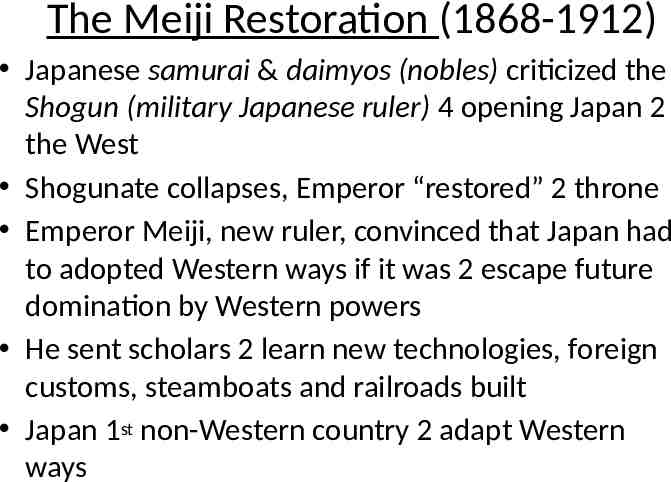
The Meiji Restoration (1868-1912) Japanese samurai & daimyos (nobles) criticized the Shogun (military Japanese ruler) 4 opening Japan 2 the West Shogunate collapses, Emperor “restored” 2 throne Emperor Meiji, new ruler, convinced that Japan had to adopted Western ways if it was 2 escape future domination by Western powers He sent scholars 2 learn new technologies, foreign customs, steamboats and railroads built Japan 1st non-Western country 2 adapt Western ways
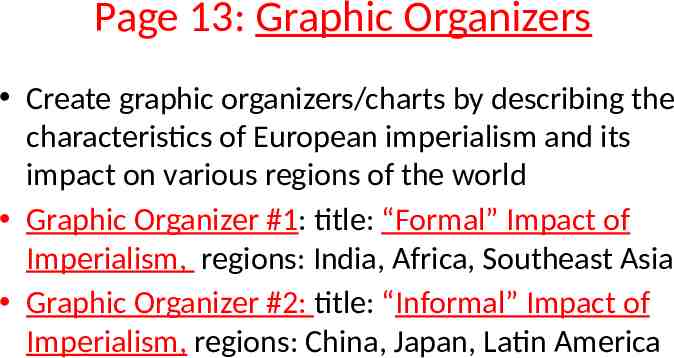
Page 13: Graphic Organizers Create graphic organizers/charts by describing the characteristics of European imperialism and its impact on various regions of the world Graphic Organizer #1: title: “Formal” Impact of Imperialism, regions: India, Africa, Southeast Asia Graphic Organizer #2: title: “Informal” Impact of Imperialism, regions: China, Japan, Latin America
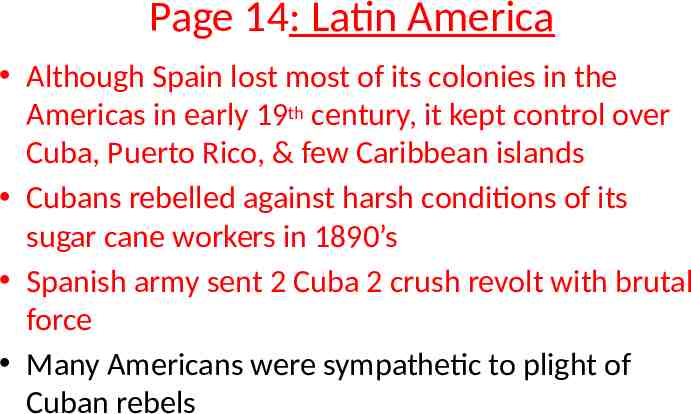
Page 14: Latin America Although Spain lost most of its colonies in the Americas in early 19th century, it kept control over Cuba, Puerto Rico, & few Caribbean islands Cubans rebelled against harsh conditions of its sugar cane workers in 1890’s Spanish army sent 2 Cuba 2 crush revolt with brutal force Many Americans were sympathetic to plight of Cuban rebels
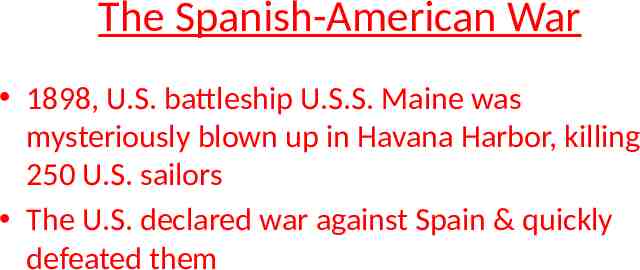
The Spanish-American War 1898, U.S. battleship U.S.S. Maine was mysteriously blown up in Havana Harbor, killing 250 U.S. sailors The U.S. declared war against Spain & quickly defeated them
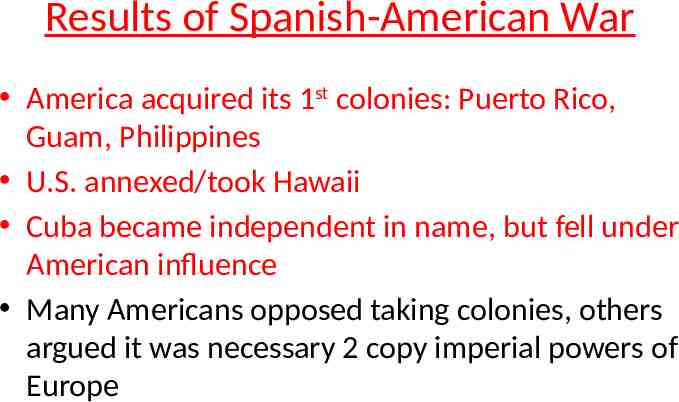
Results of Spanish-American War America acquired its 1st colonies: Puerto Rico, Guam, Philippines U.S. annexed/took Hawaii Cuba became independent in name, but fell under American influence Many Americans opposed taking colonies, others argued it was necessary 2 copy imperial powers of Europe
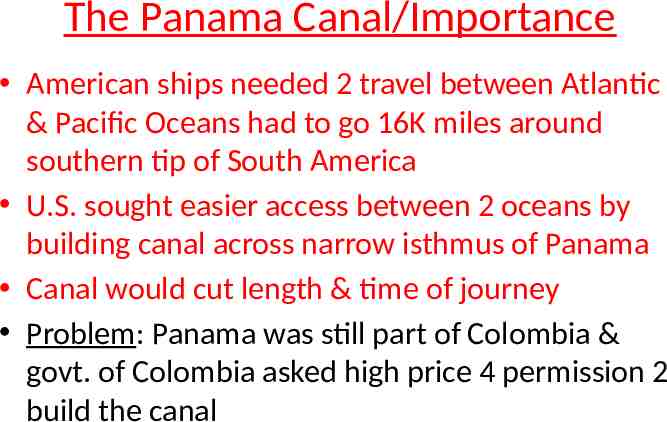
The Panama Canal/Importance American ships needed 2 travel between Atlantic & Pacific Oceans had to go 16K miles around southern tip of South America U.S. sought easier access between 2 oceans by building canal across narrow isthmus of Panama Canal would cut length & time of journey Problem: Panama was still part of Colombia & govt. of Colombia asked high price 4 permission 2 build the canal
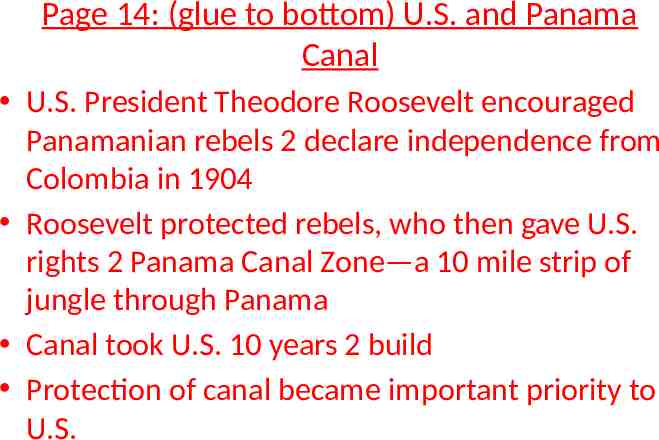
Page 14: (glue to bottom) U.S. and Panama Canal U.S. President Theodore Roosevelt encouraged Panamanian rebels 2 declare independence from Colombia in 1904 Roosevelt protected rebels, who then gave U.S. rights 2 Panama Canal Zone—a 10 mile strip of jungle through Panama Canal took U.S. 10 years 2 build Protection of canal became important priority to U.S.
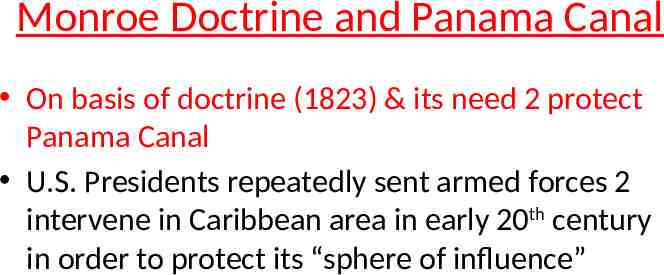
Monroe Doctrine and Panama Canal On basis of doctrine (1823) & its need 2 protect Panama Canal U.S. Presidents repeatedly sent armed forces 2 intervene in Caribbean area in early 20th century in order to protect its “sphere of influence”

The End






